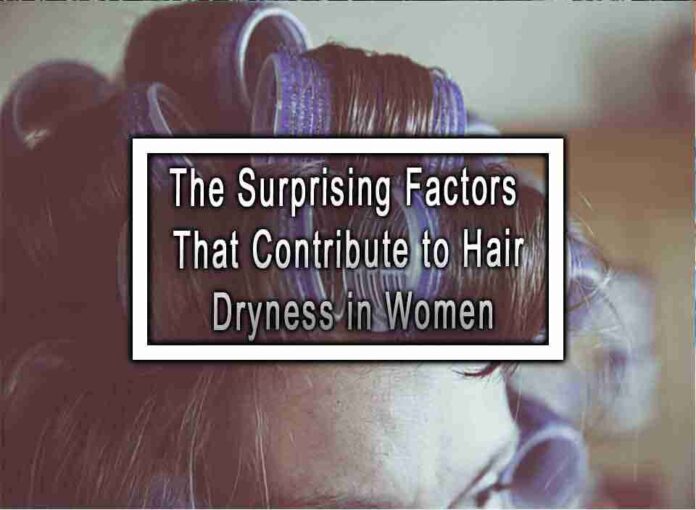Hair dryness in women can be caused by several factors, some of which may come as a surprise. Here are a few surprising factors that can contribute to hair dryness:
1. Overwashing
Washing your hair too frequently can strip away its natural oils, leading to dryness. While it’s essential to keep your scalp and hair clean, aim to wash your hair only as often as necessary, typically every 2-3 days. Experiment with different washing frequencies to find what works best for your hair type.

2. Hot Water
Washing your hair with hot water can strip away moisture and make it more prone to dryness. Opt for lukewarm or cool water instead. Additionally, avoid long, hot showers as they can contribute to overall dryness of both the hair and skin.
3. Excessive Heat Styling
Frequent use of heat styling tools like flat irons, curling irons, and hair dryers can lead to hair dryness. The high temperatures from these tools can cause moisture loss and damage to the hair shaft. Try to minimize heat styling and use heat protectant products when you do.
4. Environmental Factors
Environmental factors such as dry air, low humidity, sun exposure, and wind can contribute to hair dryness. Protect your hair from harsh elements by wearing hats, scarves, or using protective hair products with SPF. Consider using a humidifier in your living space to add moisture to the air.
5. Incorrect Hair Products
Using hair products that are not suitable for your hair type can contribute to dryness. Avoid products that contain harsh sulfates, alcohol, or excessive amounts of drying ingredients. Instead, choose hydrating shampoos, conditioners, and styling products specifically formulated for dry or damaged hair.
6. Improper Brushing and Styling Techniques
Rough brushing or using the wrong type of brush can lead to hair breakage and dryness. Use a wide-toothed comb or a brush with soft bristles to detangle your hair gently. Start brushing from the ends and work your way up to avoid unnecessary strain and damage.
7. Nutritional Deficiencies
Nutritional deficiencies, specifically inadequate intake of essential fatty acids, vitamins (such as biotin, vitamin A, and vitamin E), and minerals (such as zinc and iron), can impact the health and moisture levels of your hair. Ensure you have a balanced diet that includes a variety of nutrient-rich foods to support healthy hair.
8. Hormonal Changes
Hormonal changes, such as those that occur during menopause or pregnancy, can affect the moisture levels of the hair. Fluctuations in hormone levels can lead to dryness and changes in hair texture. Consult with a healthcare professional to address any underlying hormonal issues.
It’s important to note that individual factors and hair types vary, so what may cause dryness for one person may not be the same for another. If you’re experiencing persistent hair dryness or concerns, it’s advisable to consult with a professional hairstylist or dermatologist who can provide personalized advice and recommendations based on your specific needs.











